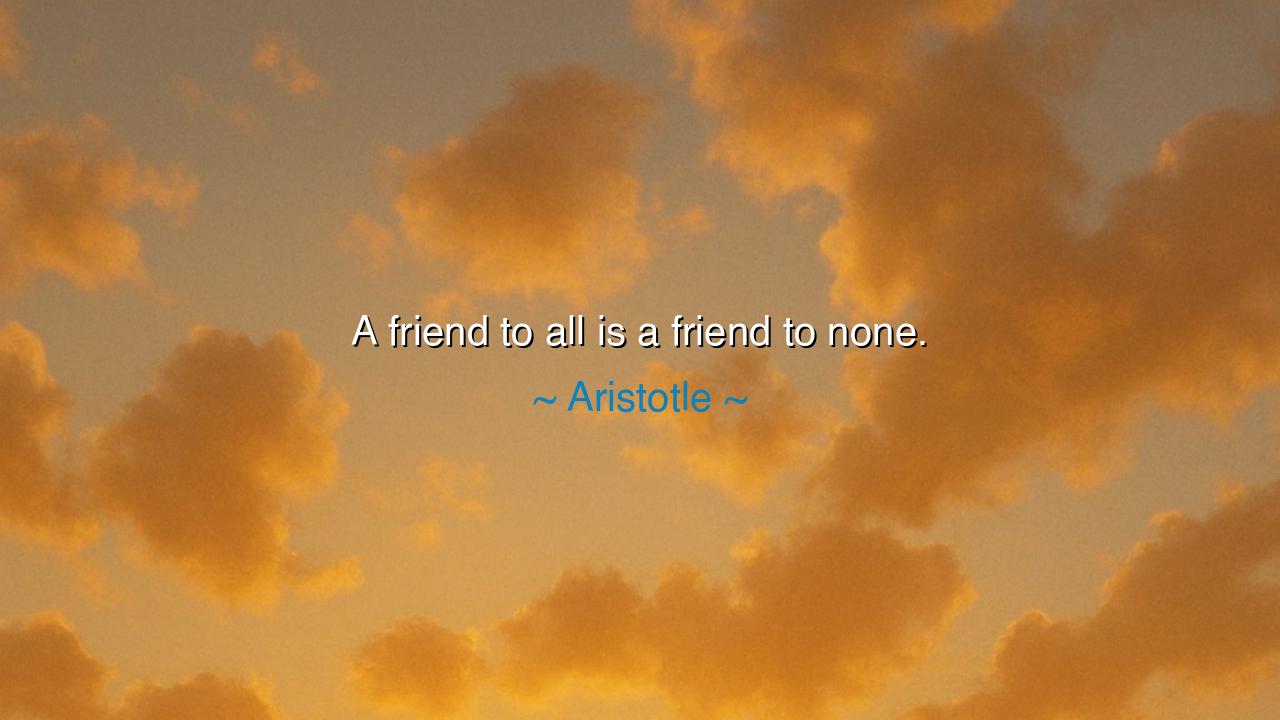
A friend to all is a friend to none.






Aristotle, the philosopher of reason and virtue, once proclaimed: “A friend to all is a friend to none.” In these words, spoken with the clarity of timeless wisdom, he reveals a truth that pierces the heart of human nature. For friendship, to be real, must be rooted in sincerity and depth — and sincerity cannot be scattered like seed upon every passing wind. The man who calls all the world his friend loves no one truly, for his affection is spread too thin to nourish any single bond. True friendship, Aristotle teaches, is not a matter of numbers, but of loyalty, trust, and devotion. The heart cannot serve a thousand masters; it must choose where it will dwell.
The origin of this saying lies within Aristotle’s reflections on ethics and the nature of human relationships, recorded in his Nicomachean Ethics. He observed that there are three kinds of friendship — those of utility, those of pleasure, and those of virtue. The first two are fleeting, formed for advantage or delight; the third is enduring, built upon mutual respect and the shared pursuit of goodness. It is this highest form of friendship that he holds sacred. And such friendship, being rare and demanding, cannot be offered to all. To be a friend to all, he warns, is to mistake friendliness for friendship — to confuse a smile for loyalty, and a greeting for devotion.
Aristotle’s wisdom speaks not only to the mind, but to the soul. The one who seeks to please everyone will stand firm for no one. Such a person becomes like a tree with shallow roots — spreading wide, but offering no shelter when the storm comes. To be a true friend, one must sometimes stand apart, choose loyalty over popularity, and truth over comfort. The man who tries to win every heart often loses his own; for he bends to every wind, changes with every tide, and in the end, belongs to no one — not even himself. Thus, Aristotle’s saying is not a condemnation of kindness, but a call to authenticity — to love few, but love deeply.
History gives us countless mirrors of this truth. Consider Brutus, the Roman senator who counted himself friend to both the Republic and to Julius Caesar. Torn between his love for Caesar and his loyalty to Rome, he tried to serve both, and in doing so, betrayed both. His dagger struck not from hatred, but from confusion — and his soul was destroyed by the very act he thought virtuous. His was the tragedy of divided friendship. In seeking to be a friend to all — to country, to ideals, to men — he became a friend to none. His fate teaches that divided loyalties weaken the heart, and that friendship, to be real, must be chosen wholly, not half-heartedly.
Aristotle’s teaching also warns against the temptation of universal approval. The one who longs to be loved by all will eventually stand for nothing. True friendship, like true character, demands courage — the courage to disagree, to correct, to stand beside what is right even when the crowd turns away. The flatterer, who befriends everyone, is a deceiver — not because he hates, but because he fears. He hides his true self behind masks of agreement, offering empty affection where honesty is required. Friendship founded on false harmony is no friendship at all; it is a hollow echo, pleasing to the ear but void of truth.
And yet, Aristotle does not call us to isolation. He does not say “be friendless,” but rather, “be discerning.” For friendship, to be sacred, must be chosen with wisdom. Seek not many companions, but a few whose hearts mirror your own. With them, cultivate the virtues of patience, honesty, and faithfulness. For these are the bonds that endure the test of time and trial. In friendship, as in all things, quality surpasses quantity. The wise man would rather have one soul who understands him completely than a hundred who only smile in passing.
So, my children of truth and reflection, let this be your lesson: do not seek to be loved by all, but to love a few rightly. Be kind to all, but give your heart only to those whose integrity and spirit call to your own. Stand firm in your loyalties, and do not fear to lose the shallow affection of the crowd. For friendship that is true will strengthen your soul, sharpen your virtue, and guide your steps as faithfully as the stars guide the sailor home.
Remember always the wisdom of Aristotle: “A friend to all is a friend to none.” Let your friendships be few but strong, humble but honest, rare but radiant. For one true friend is a greater treasure than a thousand false admirers — and the heart that chooses wisely will never be alone, even in the silence of the world.






AAdministratorAdministrator
Welcome, honored guests. Please leave a comment, we will respond soon